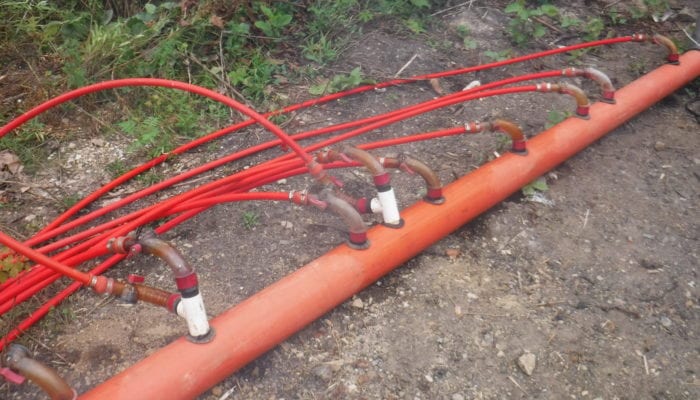Location: Valparaiso, Indiana
Owner: City of Valparaiso
G/C: Bowen Engineering Corporation
Engineer: DLZ, Inc
Project Revenue: $100,000.00

SUMMARY
The City of Valparaiso needed to install a new 72-inch diameter steel casing for the storm water sewer pipe. The excavation required to install the pipe was located under existing railroad tracks. A dewatering system that would not disrupt the working tracks was required.
The Challenge:
Griffin Dewatering installed three (3) drilled deep wells to 40 ft. around the launching pit that successfully lowered the water level. For the extent of the tunnel, groundwater is perched on top of organic soils. Water and running sands into the work-zone would cause major problems for the work now, and greatly increase the chance for future infrastructure problems.

The Solution:
To avoid adding water to the ground, Griffin designed a wellpoint dewatering system that was installed by drilling a 25 ft. hollow stem auger with a 4.25-inch ID. The wellpoints were installed inside the augers and backfilled with a silica sand. The system was able to pump approximately 50 gallons per minute (GPM) during initial testing.
The system was completed with a gang-manifold for the ¾-inch wellpoints and a Modular Vacuum Pumping System, which allowed the system to be installed within the limited space provided by the railroad tracks. Our complete solution also included:
- A 3-inch, 5 horsepower (HP) electric submersible pump
- 15 HP Vacuum pump
- An air/water separation chamber

The Griffin Difference:
Since no header pipe or discharge could be installed under the working railroad tracks, the wellpoints were connected using ¾-inch HDPE tubing. This provided the flexibility to run the tubing under the tracks in between the railroad ties.
By overcoming the perched water issue, the tunneling contractor was able to successfully install the steel casing and complete the storm sewer.
Because a diesel pump was not required, Griffin’s solution saved the contractor significant O&M expenses by eliminating the need for one set of pump operators around the clock at an estimated cost savings of $20,000.00 per week.